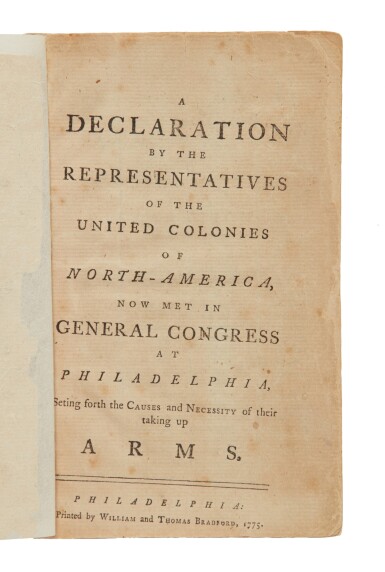Making Our Nation: Constitutions and Related Documents. Sold to Benefit the Dorothy Tapper Goldman Foundation. Part 1
Making Our Nation: Constitutions and Related Documents. Sold to Benefit the Dorothy Tapper Goldman Foundation. Part 1

Continental Congress | An important congressional precursors of the Declaration of Independence
Auction Closed
November 23, 05:04 PM GMT
Estimate
40,000 - 60,000 USD
Lot Details
Description
Continental Congress
A Declaration by the Representatives of the United Colonies of North-America, now Met in General Congress at Philadelphia, Seting [sic] forth the Causes and Necessity of their taking up Arms. Philadelphia: William and Thomas Bradford, 1775
8vo (184 x 118 mm). Half-title; half-title and terminal leaf laid down on Japanese tissue, right margin of terminal leaf torn with some text loss to final six lines. Stitched. Navy cloth chemise and slipcase, navy morocco spine lettered gilt.
First pamphlet printing of one of the most important congressional precursors of the Declaration of Independence. The writing of the Declaration of the Causes was—like the Declaration of Independence—assigned to a committee but in fact it was largely the work of Thomas Jefferson. John Dickinson also played a prominent role in tempering the final language of the document which nevertheless remained a spirited manifesto. It was one of the first attempts by Congress to justify to their constituents and to the world at large the need for armed resistance to the Crown. John Adams, for one, approved, writing in a 6 July 1775 letter to William Tudor: "We have spent this whole Day in debating Paragraph by Paragraph a Manifesto as some call it, or a Declaration of the Causes and Necessity of our Taking up Arms. It will be printed Tomorrow, and shall be transmitted as Soon as possible. It has some Mercury in it, and is pretty frank, plain, and clear" (Letters of the Delegates to Congress, ed. Smith, 1:287).
The "mercury" is present in the Declaration's first paragraph: "If it was possible for men, who exercise their reason to believe, that the Divine Author of our existence intended apart of the human race to hold an absolute power in, and an unbounded power over others, marked out by his infinite goodness and wisdom, as the objects of a legal domination, never rightfully resistable, however severe and oppressive, the Inhabitants of these Colonies might at least require the Parliament of Great-Britain, some evidence, that this dreadful authority over them has been granted to that body.
The text, issued over the name of John Hancock, as President of Congress, goes on to detail the losses of property and personal rights, as well as the atrocities committed by the British at Lexington and Concord, that have compelled them to take up arms. This very scarce first American pamphlet edition was preceded only by a printing of the Declaration of the Causes in the 10 July 1775 issue of the Pennsylvania Packet and by a broadside "Postscript" to the Pennsylvania Gazette on 12 July.
REFERENCE
Adams, American Controversy 75–149a; ESTC W30722; Evans 14544; Howes D198; Sabin 19158; Streeter 2:763
